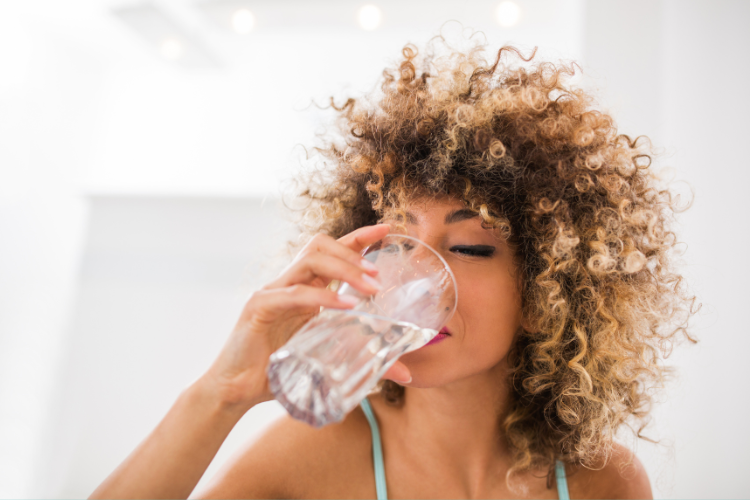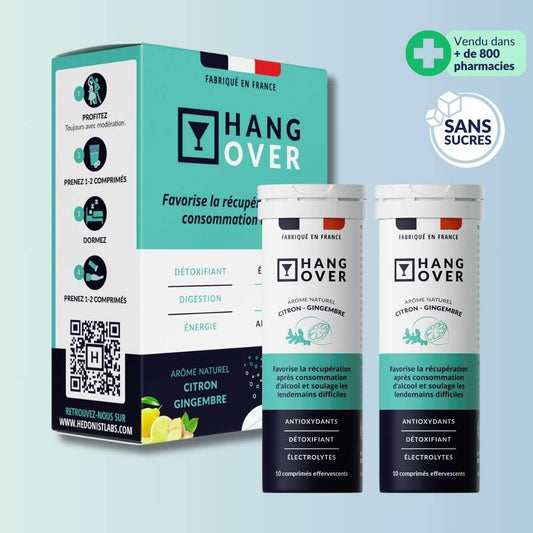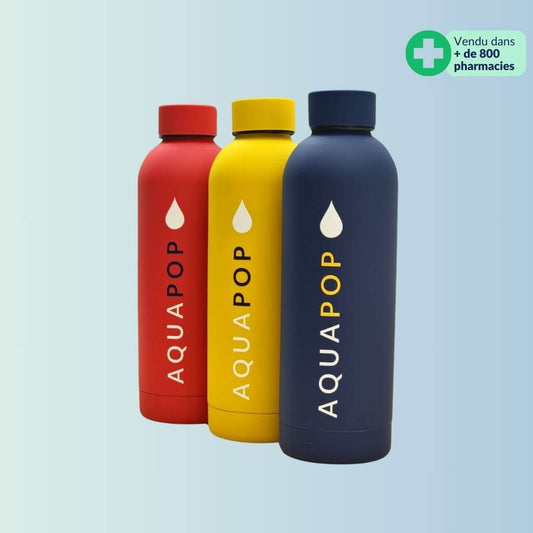The Hedonist Labs Team
Exercise, heat… While rehydration is essential in certain contexts and glucose is widely used in rehydration solutions, healthier alternatives can be considered.
Do we need to reach for sugar when feeling dehydrated?
Rehydration is an essential process to restore the body's water balance after fluid loss due to exercise, heat, or other factors. In this context, the question of glucose intake during rehydration is divisive. Glucose, as the primary fuel for cells, is often considered a key element in restoring energy and fluid levels.
However, its exact role in this context and its impact on the effectiveness of rehydration remain subjects of debate. Here we will explore the pros and cons of the importance of glucose in the rehydration process, highlighting recent research and the implications for clinical and sports practice. But first, why is it essential to rehydrate?
- Maintaining water balance: Water is vital for many bodily functions, including temperature regulation, nutrient transport, and waste elimination. Rehydration helps compensate for water losses due to respiration, sweating, urination, and other biological processes.
- Restoring electrolytes: In addition to water, rehydration often involves replacing lost electrolytes such as sodium, potassium, and chloride. These substances are crucial for maintaining fluid balance within cells, muscle contraction, nerve transmission, and other physiological functions.
- Preventing dehydration: Adequate hydration is essential to avoid dehydration, which can lead to decreased physical and mental performance, electrolyte imbalances, lower blood pressure, and other health problems.
- Optimizing recovery: Rehydration is essential after physical exertion or exposure to extreme environmental conditions. It promotes faster recovery by reducing fatigue, enhancing blood circulation, and helping to eliminate metabolic toxins.
When do we get dehydrated?
The dehydration process is simple to understand; it occurs when the body loses more fluids than it absorbs. This phenomenon can happen for various reasons, including intense physical activity, exposure to high temperatures, illness, insufficient fluid intake, or a combination of these factors. Here are the stages of the dehydration process and its consequences:
- Fluid loss: The dehydration process starts with a net loss of body fluids. This can occur through excessive sweating, breathing, frequent urination, diarrhea, or vomiting.
- Mild dehydration: In the early stages, mild dehydration can manifest as thirst, dry mouth, reduced urine output, fatigue, and headaches.
- Moderate dehydration: If fluid loss continues, dehydration can become more pronounced. Symptoms may include dry, dull skin, increased heart rate, decreased blood pressure, muscle cramps, dizziness, and mental confusion.
- Severe dehydration: At this advanced stage, dehydration can become dangerous and require immediate medical intervention. Symptoms may include an inability to urinate, cold and clammy skin, rapid and shallow breathing, severe weakness, and even fainting.
The consequences of dehydration can be severe and affect many body systems, including:
- Electrolyte imbalances: Excessive fluid loss can disrupt the balance of essential electrolytes such as sodium, potassium, and chloride, leading to dangerous electrolyte imbalances.
- Kidney failure: Prolonged dehydration can impair kidney function by reducing blood flow to the kidneys and increasing the risk of kidney stone formation.
- Impact on the cardiovascular system: Severe dehydration can decrease blood volume, increase blood viscosity, and increase the load on the heart, leading to cardiovascular complications such as cardiac arrhythmias or circulatory collapse.
- Decreased physical and cognitive performance: Dehydration can lead to decreased physical capacity, impaired concentration, memory, and cognitive functions, negatively impacting performance at work, school, or during sports activities.
The role of electrolytes and carbohydrates in rehydration
Electrolytes, such as sodium and potassium, are essential for maintaining water balance, regulating thirst, and preventing electrolyte imbalances during rehydration. They also promote nerve transmission and muscle contraction.
Carbohydrates, mainly in the form of glucose, provide a caloric energy source and help replenish muscle glycogen stores. These properties make glucose suitable for intense sports practice, but it offers no added value when exposed to high heat, for example. It is essential to choose a rehydration solution that fits your needs and be mindful of its composition.
Water and nutrient absorption by the body's cells occurs primarily through two mechanisms:
- 1. Osmosis: Water movements through the intestinal wall are osmotically conditioned. That is, when sodium (an electrolyte), for example, is absorbed, water follows. A passive process occurs when water moves from a region of higher concentration to a region of lower concentration through a semi-permeable membrane.
- Facilitated diffusion: Some nutrients, such as glucose and electrolytes, are transported across the cell membrane with the help of specific proteins called transporters.
Glucose in rehydration allows:
* Significant caloric intake
* Contributes to water absorption in the intestine.
* Replenishes sugar stores in the liver
What are the alternatives to glucose in rehydration solutions?
Alternatives to glucose in rehydration solutions include simple carbohydrates like fructose, glucose polymers, and carbohydrate-free electrolytes. These alternatives can provide an energy source and promote water absorption without causing the same blood sugar spikes as glucose, which can be beneficial in certain cases, such as for people with diabetes or those looking to avoid a significant insulin response. Consuming a glucose-free rehydration solution is healthier and more suitable for your body.
In some specific cases, such as for people with diabetes or gastrointestinal disorders, it may be necessary to choose glucose-free rehydration solutions. It is also essential to consider individual electrolyte and glucose needs, depending on physical activity, duration and intensity of effort, and environmental conditions. When in doubt, it is recommended to consult a healthcare professional for personalized advice on the best rehydration options.
In conclusion, rehydration is a vital process for maintaining water balance and restoring the body's energy reserves. Electrolytes, such as sodium and potassium, are essential for regulating cellular hydration and preventing electrolyte imbalances. While glucose is widely used in rehydration solutions, healthier alternatives can be considered.
At Hedonist Labs, we have developed a rehydration solution, AQUAPOP, which is glucose-free, calorie-free, and its composition is suitable for children from 10 years old to seniors. Your hydration partner can support you during sports practices, periods of intense heat, intense physical work, or a moment of well-being.





